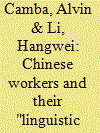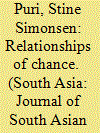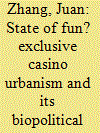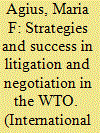|
|
|
Sort Order |
|
|
|
Items / Page
|
|
|
|
|
|
|
| Srl | Item |
| 1 |
ID:
176384


|
|
|
| 2 |
ID:
126653


|
|
|
|
|
| Publication |
2013.
|
| Summary/Abstract |
As Professor Ian Brown's recent work on the colonial prison in British Burma has shown, the proportion of the population convicted of crimes was routinely and markedly higher than in any other province of British India. Part of the explanation for the exceptionally high figures may be the colonial criminalization of practices that were previously lawful. Gambling was one such activity that the British, at least according to their rhetoric, were intent on prohibiting as part of their 'civilizing mission'. However, in practice colonial law was more ambiguous and equivocal. Government prosecutors and judges disputed the definition of gambling and struggled to differentiate it from other tolerated practices. Beyond these legal difficulties, individual British officials often found it necessary to turn a blind eye to gambling. On an everyday level, subordinate officials in the police and magistracy had an ambivalent relationship with gambling. Although empowered to suppress it, some chose to ignore its presence and others still were actively conniving with it. By studying how the British sought to control gambling in the colony at the turn of the twentieth century, this article seeks to restore the full complexity to the history of criminality in colonial Burma.
|
|
|
|
|
|
|
|
|
|
|
|
|
|
|
|
| 3 |
ID:
155554


|
|
|
|
|
| Summary/Abstract |
For the past year, a network of journalists from Africa, Australia, Europe, Latin America, and the United States have been investigating the global lottery industry. Jeff Kelly Lowenstein and Raymond Joseph discuss the misspending, tax avoidance, and fraud they have uncovered.
|
|
|
|
|
|
|
|
|
|
|
|
|
|
|
|
| 4 |
ID:
156690


|
|
|
|
|
| Summary/Abstract |
In the aftermath of the 2008 global financial crisis, luxurious mega-casino resorts have become spectacles of economic growth across diverse destinations in Asia. With its emphasis on large-scale integrated resorts (IR), the casino and leisure industry is a site of economic rejuvenation even as it offers spaces of moral corruption. Integrated mega-casinos are ambiguous projects of development, driving the speculative processes of place-making for accumulation, social control, and global competition. This editorial introduction focuses on three main themes. First, mega-IR projects show the historical and complicated relations between state power and the gambling economy. Second, Southeast Asia’s new mega-casinos are emblematic of speculative urbanism and its experiments. Third, casino-as-development consolidates the differentiated treatment of citizen subjects and gives legitimacy to the biopolitical governance of citizen practices, claims, and urban participation.
|
|
|
|
|
|
|
|
|
|
|
|
|
|
|
|
| 5 |
ID:
155555


|
|
|
|
|
| Summary/Abstract |
World Policy Institute fellow Khadija Sharife investigates the tax avoidance strategies of one of the world’s biggest lottery corporations. While the company, GTech (now known as IGT), profits off the poor, it has shielded hundreds of millions in revenue from the tax man by “inverting” its headquarters overseas and relying on tax havens.
|
|
|
|
|
|
|
|
|
|
|
|
|
|
|
|
| 6 |
ID:
083852


|
|
|
|
|
| Publication |
2008.
|
| Summary/Abstract |
Donors and aid agencies are now looking to strategies of pro-poor economic growth to raise living standards in developing countries. I critically examine how particular conceptualisations of economy and economic development shape the broader context within which pro-poor growth approaches are implemented by governments and development agencies. While pro-poor growth may expand a national economy, surplus will be distributed in a community and among individuals according to culturally specific logics. To exemplify this point I discuss the community economy of Bomolo on the remote, rural island of Flores, Indonesia. The Ngadha people of Bomolo are identified by the Indonesian state, religious organisations and development agencies as lacking and in need of economic development. Yet in Bomolo, gambling, although illegal and antithetical to development, is fantastically popular, and large amounts of cash surplus are spent on this popular pastime. I argue for more attention to the issue of surplus - the outcome of pro-poor growth. In particular, I propose that surplus distribution is a crucial yet underdeveloped component of the growth equation
|
|
|
|
|
|
|
|
|
|
|
|
|
|
|
|
| 7 |
ID:
156694


|
|
|
|
|
| Summary/Abstract |
NagaWorld, the only integrated resort and casino in Phnom Penh and touted as the first of its kind in Southeast Asia, currently holds a privileged position in Cambodia’s gaming industry: a unique government agreement for a seventy-year gaming license until 2065 and a casino monopoly agreement for Phnom Penh City until 2035. Its corporate management cleverly leveraged NagaWorld’s special status with the Royal Government of Cambodia (RGC) to facilitate stellar profits. This article analyzes the intersection of NagaWorld’s business history with the political economy of Cambodia from the 1990s. It argues that NagaWorld’s special relationship with politicians can be understood in terms of its status as a new form of “monopoly revenue farm” within Cambodia’s custom of patron clientism. Its viability as a business model for casino capitalism in other areas of Southeast Asia may be limited unless similar monopoly conditions can be replicated.
|
|
|
|
|
|
|
|
|
|
|
|
|
|
|
|
| 8 |
ID:
144362


|
|
|
|
|
| Summary/Abstract |
This paper examines male friendship at the Delhi racecourse as an example of a sociality amidst an urban South Asian setting defined by uncertainty and the absence of fixed identities. It argues that such friendships are ‘relationships of chance’, embodying and reflecting the contingency of the gambling arena, rather than sociological or ritual notions which may condition friendship in other settings. This hyper-competitive and hyper-social space configures both the possibility and impossibility of friendship. The paper thus provides insights into how relating to others happens in a heterogeneous, fluid context that is over-determined mainly by a shared passion for self-enrichment.
|
|
|
|
|
|
|
|
|
|
|
|
|
|
|
|
| 9 |
ID:
156692


|
|
|
|
|
| Summary/Abstract |
This paper interrogates the exclusionary politics of casino urbanism in Singapore, especially in terms of how this particular brand of urbanism reproduces disciplinary regimes through the uneven consumption of fun and leisure. Singapore’s vision of becoming a world-class “state of fun” is accompanied by increasingly sophisticated measures of boundary making between global leisure citizens and the excluded others, often comprised of the working class and those deemed to be at risk or lacking self-control and responsibility. The evolving biopolitical borders coincide with the multiple borders set up around Singapore’s casino spaces, ensuring the exclusive consumption of Singapore’s casino urbanism by the wealthy few. The fun regimes help to normalize social exclusion, moralize disciplinary control, and give legitimacy to the new class of global consumers under the operations of the state-capital apparatus. This paper argues that exclusive casino urbanism has broader social and political implications on issues of equality, accessibility, and urban participation.
|
|
|
|
|
|
|
|
|
|
|
|
|
|
|
|
| 10 |
ID:
113960


|
|
|
|
|
| Publication |
2012.
|
| Summary/Abstract |
This article analyzes linkages between litigation in the World Trade Organization (WTO) Dispute Settlement Body (DSB) and negotiation in multilateral trade rounds and develops a typology of links that can occur between the two processes. These include creating conditions where bargaining is informed by law, influencing the agenda-setting and creating momentum for negotiation on key issues, and affecting the status quo from which negotiations proceed by influencing interpretation of trade rules in the DSB. The purpose is to test whether poor and inexperienced states that are disadvantaged in negotiations can improve their bargaining power in negotiation rounds by pursuing legal proceedings, to see whether links can be exploited for strategy-making to promote the interests of these states, and to discuss how the WTO as an international organization benefits from their empowerment. The strategies suggested in this article could improve the commitment and active participation of relatively non-influential member states. This could be conducive to perceptions of the WTO as a legitimate organization and to a more constructive climate for effective negotiations.
|
|
|
|
|
|
|
|
|
|
|
|
|
|
|
|
| 11 |
ID:
130543


|
|
|
|
|
| Publication |
2014.
|
| Summary/Abstract |
This paper examines whether a casino tax is good for local welfare in a tourism economy. We find that what is important for efficiency is not the tax rate itself but the tax incidence on tourists. Casino tourism in Macao engages in price discrimination via market segmentation. We prove that, compared with the mass market, the VIP market will grow faster with a greater price rise if a tax hike on the VIP market is not large, but will grow less rapidly with a smaller price increase if the tax hike is very large. An empirical study is carried out using data from Macao, which is typical of segmenting markets for discriminatory pricing. We show that our theory is largely consistent with observed evidence. This paper also provides some policy recommendations useful for Macao. We propose that its casino tax should be kept low at its current rate in the mass market but be raised substantially in the VIP market if its economic growth is to be made less unbalanced and more sustainable.
|
|
|
|
|
|
|
|
|
|
|
|
|
|
|
|
|
|
|
|
|